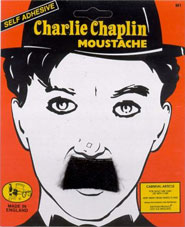Conference report by Vincent Byrne Jnr.

'many soldiers [in WWI] grew moustaches in the style of Chaplin to amuse fellow soldiers'
Charlie Chaplin was arguably the greatest comedian of the twentieth century; he is an important historical figure in film, politics, music, and literature. In the history of film, few come close to Chaplin's skill as a complete auteur. His life and times have been widely documented through a vast amount of biographies, documentaries, radio programmes, films, and more recent mediums, for example the internet.
Therefore it was nice to discover that the British Film Institute's Chaplin Conference held in London, was the first gathering of its kind devoted in its entirety to Chaplin.
The prospect of attending such a conference was an exciting one. Papers would be delivered by some of the finest Chaplin scholars. There would be the chance to meet these people and share with them a common interest in Chaplin.
The conference was held at the London college of Communication. Among those present were Glenn Mitchell, David Robinson, Frank Schiede, Neil Brand, Dan Kamin, Paul Merton and many other Chaplin aficionados. Thursday the 21st July, and the first event was the screening of the newly restored Keystone, with an introduction by Glenn Mitchell author of the invaluable Chaplin Encyclopaedia, and music by Neil Brand, famous pianist accompanist to silent films. It was an ideal way to start the conference and very satisfying to see clear prints, of these 1914 films. This was followed by a presentation on Chaplin and the music hall, by Chaplin biographer David Robinson.
Next, there was one of my favourite papers by Dan Kamin, he spoke about Chaplin and the body language in his films, he chose a scene in Easy Street (1917), and brought light upon another more subtle side to Chaplin's films. To round of the day was a trip to England's oldest music hall Wiltons, and a reception, which meant an opportunity to meet and speak with various people, for example David Robinson and Neil Brand, and others.
Friday, and there was a fascinating paper on Chaplin and his cultural impact on the Canadian soldiers in World War 1. The paper contained some interesting pieces of Trivia, for example, many soldiers grew moustaches in the style of Chaplin to amuse fellow soldiers.
Other highlights included a screening of another three Keystone films. One interesting paper was by Professor David Trotter, named Chaplin and Modern Mimesis, in which the Professor spoke of the Chaplin films from a highly intellectual point of view. Later, there was a talk on the restoration work of the Keystone films; this was a useful insight to the work that goes into the restoration of early silent films. At the end of the day there was an open-air screening of Easy Street, and Shoulder Arms (1918), plus some rarities from the archives of the Imperial War Museum.
The final day in which we were present was Saturday. This commenced with a series of papers on Chaplin and Germany. These paper were superbly constructed and well researched, for example Joseph Garncarz, discovered a poll of top films for the 1928-1929, season in which Chaplin's The Circus (1928) came relatively low down, in comparison with other films of the season. This showed that Chaplin was actually not as popular with German audiences as one would expect - especially considering his triumphant reception in Berlin in 1931.
The final screening of the restored Keystones, followed by a talk on the re-scoring of Chaplin's A Woman of Paris (1923), by Timothy Brock. Some audio tapes of Chaplin actually playing the piano, (which had never been heard before), were also played. The final series of papers were on Chaplin in Imitators, and highlights included clips of Chaplin Imitators in Bombay, a discussion on Chaplin imitators in the media, and his costume.
The conference had come to end for me, and it was time to leave. The journey back to Birmingham, gave time for reflection. The conference was invaluable for a number of reasons, not least because for three days there was a chance to listen, learn and live Chaplin. It has enhanced my knowledge of a true great and personal favourite entertainer. The conference was well worth attending and a celebration that would have made Chaplin proud.